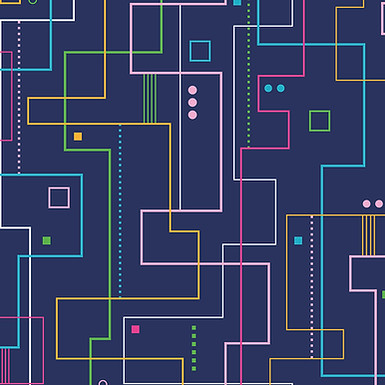Python Intro Series
Python 101 - Basic Data
10 hours
In-person or Online
This is our intro course to programming in Python for absolute beginners. Learn the basics of computer programming through electronic music! Coding is the writing of instructions for a computer to execute. Like any written language, it has expressive power.
As a tween and teenager, learn to write code so that you can bring music to life by manipulating musical data and arranging musical samples. Gain not only a key skill in the digital age, but also the ability to make your own electronic music!
Python 102 - Functions
20 hours
In-person or Online
Our follow-on course dives deeper into a key coding tool - the use and creation of functions. Functions are a set of instructions that perform a specific task in your program. To use functions well, you need a strong intuition for how tasks are organised within your program, where data is kept, how to keep track of different moving parts, as well as how to decompose large, hairy problems into more bite-sized issues that can be tackled.
Fractals & geometric art is a powerful way to see the beauty of writing and using functions in your code. In this course, learn to meld music, art and code in a multi-media symphonic project!
Python 103 - Lists & Dictionaries
20 hours
In-person or Online
Up to this point, we've mostly been dealing with simple data types. Code becomes much more helpful with large datasets if you are able to organise that data in ordered lists or pair up information in unordered key-value pairs, also known as a dictionary.
In this course, we dive back into the world of electronic music to see how musical notes, effects, and other musical parameters, when stored in lists and dictionaries, gives music producers (like you!) more power and autonomy when arranging music.
Python 104 - Objects
20 hours
In-person or Online
As the final course in our Python beginner series, students will encounter the most complex data type in this series -- an object. Objects are complex data types that can include any combination of simple data, complex data, and even functions (a.ka. methods). Whereas we had thus far been honing our aptitude in accessing and manipulating data, objects gives us the power to reproduce and build more complex data structures.
We will complete projects in music, art as well as the broader creative endeavour of story-telling. These interdisciplinary projects will give students a wide range of opportunities to apply all their programming skills to express themselves.
Make music
with Python
Make art
with Python
Make music
with Python
Make art
with Python
01/
Computer Science Concepts
-
sequencing
-
variables
-
loops
-
conditionals
02/
Data Types
-
integers
-
float
-
strings
-
Boolean
03/
Computational Thinking Skills
-
Algorithms
-
Pattern Recognition
04/
Ideas in Music Production
-
What is music production
-
Digital Audio Workstations (DAWs)
-
The physics of sound
-
Music as an expressive & affective tool
-
Arrangement
-
Beats, bars & tempo
01/
Computer Science Concepts
-
variables
-
loops
-
conditionals
-
functions
02/
Data Types
-
integers
-
float
-
strings
-
Boolean
03/
Computational Thinking Skills
-
Decomposition
-
Abstraction
04/
Geometric Art & Fractals
-
What is geometry and fractals
-
The golden ratio
-
Recursive drawings
01/
Computer Science Concepts
-
sequencing
-
variables
-
loops
-
conditionals
-
functions
02/
Data Types
-
lists
-
dictionaries
03/
Computational Thinking Skills
-
Decomposition
-
Abstraction
04/
Ideas in Music Production
-
Hooks, motifs, fills
-
Sampling
-
Mixing
-
Vocals
01/
Computer Science Concepts
-
sequencing
-
variables
-
loops
-
conditionals
-
functions + methods
02/
Data Types
-
lists
-
dictionaries
-
objects
03/
Computational Thinking Skills
-
Algorithms
-
Pattern Recognition
-
Decomposition
-
Abstraction
04/
Ideas in Music Production
-
Hooks, motifs, fills
-
Sampling
-
Mixing
-
Vocals

